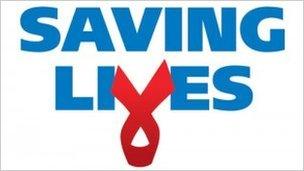Doctors are "reluctant" to test routinely for HIV
- Published

The "Saving Lives" campaign at Birmingham Heartlands Hospital targets those with undiagnosed HIV
About 22,000 people in the UK have HIV - but are unaware they have it.
In this week's Scrubbing Up, Dr Stephen Taylor, consultant physician in sexual health and HIV medicine, argues that lives are being unnecessarily lost because clinicians are reluctant to test for HIV.
I have been fortunate enough in my medical career to see real improvements in the treatment options we can offer our HIV positive patients. In the early 1980s we did not even have a name for HIV; now we have a wide range of anti-retroviral drugs.
We have made huge, rapid steps in our understanding of and ability to combat HIV. A patient properly treated now has a life expectancy of 30 years or more and can live those years as fruitfully and successfully as anyone.
But people still die with HIV. There is no cure and treatment can be tricky. Patients can develop drug resistance and often do not even present themselves to HIV services until very late.
One in four of those infected with HIV does not know they are infected. The people who are dying from HIV now are, in general, those who are diagnosed so far down the road that the effectiveness of our drug regimes are significantly reduced.
Reluctance to test
There are many reasons for this: prejudice, a lack of awareness and especially a reluctance to test. Education is the key solution to each of these problems. We must correct the many inaccurate assumptions about HIV.
Too many heterosexuals still believe they are not at risk of infection, too many young people are becoming increasingly complacent about a condition they think is under control - and it is simply not true that taking an HIV test adversely affects your insurance premiums or your ability to get a mortgage.
Yet many physicians continue to propagate these messages.
Some 95% of all pregnant women now receive an HIV test as a standard part of their antenatal care. I, and many others in the HIV community, believe this is a courtesy which should be extended to the wider population.
Only through more effective and more widespread testing can we make earlier diagnoses, reduce undetected HIV cases and thus halt onward transmissions. This is a sentiment recently echoed by Anne Milton, the public health minister, at the recent "Time to Test" campaign held at the Royal College of Physicians to mark World Aids Day.
Not only does normalising HIV testing make good clinical sense, but early testing could ultimately build towards achieving the £1.1bn cost savings that could be associated with solid HIV prevention strategies.
Cost pressure
However, here is the rub: the cost savings are not immediate. In fact, initially the cost of HIV care will increase as those blissfully unaware that they are infected become an immediate cost pressure for the NHS.
But I maintain that normalising and increased testing has got to be the way forward. Regular testing and getting people on treatment is likely to be one of the most powerful tools we now have to reduce ongoing transmission of HIV and its long-term impacts.
In my own hospital, we are launching a new HIV testing awareness campaign - Saving Lives - in an attempt to reduce undiagnosed infections and prevent avoidable mortality and morbidity.
Its method is simple: to arm clinical practitioners, whatever their discipline or role, with knowledge of the symptoms and signs that HIV can present with and of the necessity of testing for it.
If clinicians work together, and test every patient presenting with "indicator conditions" - not just those people we assume to be more at risk - will we diagnose HIV early, when treatment can do the most good.
Save lives
It is a very scary statistic that today in the UK there are over 22,000 people infected with HIV who are unaware they are infected. We must prioritise diagnosing them, especially as HIV can be symptomless for many years.
So regular blood testing is often not just our best but our only tool in controlling the spread of HIV.
We must therefore target the assumptions of the public and clinicians alike. Accessible public awareness campaigns like "Beer Goggles Johnny" may help get sexual health messages through to resistant demographics.
And if we can integrate HIV testing into patient pathways, and be more proactive in our efforts to get patients on to treatment early, we can continue to make significant progress in our fight against HIV.
The trouble is, talk is cheap. Unless the government, local PCTs and hospital trusts attach an importance and an incentive to encourage testing - be it with a carrot or a stick - I fear testing will not increase and our opportunity to save lives will once again be missed.
Your comments